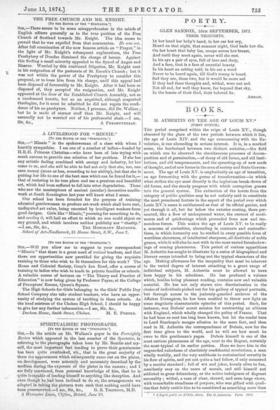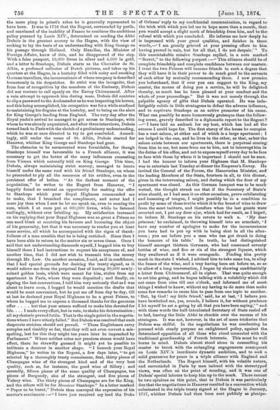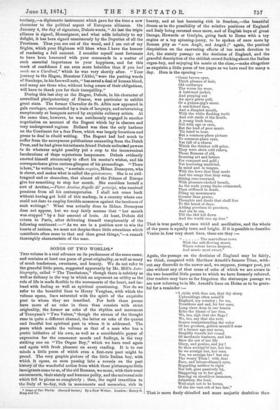BOOKS.
M. AUBERTIN ON THE AGE OF LOUIS XV.* [FIRST NOTICE.]
THE period comprised within the reign of Louis XV., though obscured by the glare of the two periods between which it lies, the age of Louis XIV. and the age commencing with the Re- volution, is one abounding in serious interest. It is, in a marked sense, the borderland between two distinct societies,—the field on which can be observed the simultaneous processes of decom- position and of germination,—of decay of old forms, and old insti- tutions, and old temperaments, and the sprouting-up of new seeds of thought, and of new forces in the area of society and State Govern- ment. The age of Louis XV. is emphatically an age of transition, an age fermenting with the germs of transformation—in which what strikes the eye most directly is the inglorious break-down of old forms, and the steady progress with which corruption gnaws into the general system. The extinction of the heroic from the category of public qualities may be not unfairly said to constitute the most prominent feature in the aspect of the period over which Louis XV.'s name is emblazoned as that of its official genius, and yet through it all, but far below the exterior coating, there per- meated, like a flow of underground water, the current of senti- ments and of quickenings which proceeded from new and tre- mendous forces. This makes the age of Louis XV. to be really a museum of curiosities, abounding in contrasts and contradic- tions, in which humanity can be studied in every possible form of worthless cleverness, of intellectual sharpness, all destitute of noble graces, while it will also be met with in the most varied foreshadow- ings of coming phenomena. This period of curious apparitions M. Aubertin has sought to illustrate by a series of biographical and literary essays intended to bring out the typical characters of the age. Making allowance for the inequality that must be inherent in the varied degree of interest attaching to a great range of individual subjects, M. Aubertin must be allowed to have been happy in his selections. He has produced a volume which, besides being pleasant reading, contains new and valuable material. He has not only shown nice discrimination in the choice of individuals picked out for his gallery of typical portraits, but through access to the jealously-guarded archives of the Affaires Etrangeres, he has been enabled to throw new light on some singularly characteristic episodes of this period. Such, for instance, was Dubois' secret mission for contracting an alliance with England, which wholly changed the policy of France. That he had been so sent has long been known, but let the reader tarn to Lord Stanhope's meagre allusion to the mere fact, and then read in M. Aubertin the correspondence of Dubois, now for the first time given to the world, and he will see how much he owes to this gentleman's pages. Dubois himself is one of the most curious phenomena of the age, next to the Regent, certainly the most typical of its earlier portion. Here we have him in the unguarded nakedness of absolutely confidential revelations, a man wholly worldly, and the very antithesis to ecclesiastical severity in his flow of spirits, and yet not quite a bad fellow, if only measured by a secular standard ; full of wit and jokes, keenly alive to fun, manifestly easy on the • score of morals, and still himself not addicted to gross debauchery, or the active indulgence of flagrant sensuality ; withal, a man of clear, shrewd, and even large views, with remarkable steadiness of purpose, who was gifted with quali- ties that fairly entitle him to be considered as something more than • L'Esprit public au XVIlle. Siècle. Par C. Anbartio. Parla. 1873.
the mere pimp in priest's robes be is generally represented to have been. It was in 1716 that the Regent, surrounded by perils, and convinced of the inability of France to continue the ambitious policy pursued by Louis XIV., determined on sending the Abbe Dubois in the greatest secresy to the Hague, with the view of seeking to lay the basis of an understanding with King George on his passage through Holland. Only Huxelles, the Minister of Foreign Affairs, knew of this, and he disapproved of the step. With a false passport, 10,000 livres in silver and 4,000 in gold, and a letter to Stanhope, Dubois starts as the Chevalier de St. Albin, a professed collector of Dutch pictures, and takes up his quarters at the Hague, in a hostelry filled with noisy and smoking German travellers, the inconvenience of whose company is described humorously in his despatches. So strict was the incognito, that from fear of recognition by the members of the Embassy, Dubois did not venture to call openly on the Envoy Chateattneuf. After a vain attempt to approach him during mass, Dubois did contrive to slip a password to the Ambassador as he was inspecting his horses, and this being accomplished, his occupation was for a while confined to maintaining his disguise at the hostelry, and to being on the alert for King George's landing from England. The very day after the Royal yacht's arrival he managed to get access to Stanhope, with whom he was already acquainted, and after three interviews, Dubois turned back to Paris with the sketch of a preliminary understanding, which he was at once directed to try to get concluded. Accord- ingly, still under the name of St. Albin, Dubois started for Hanover, whither King George and Stanhope had gone.
The obstacles to be surmounted were formidable, for though Stanhope himself was favourable to a French alliance, it was necessary to get the better of the many influences emanating from Vienna which naturally told on King George. This time, Dubois, always maintaining strict secrecy, managed to locate himself under the same roof with his friend Stanhope, on whom he proceeded to ply all the resources of his artifice, even to the persistent offer of bribes. "At the darkest moment of the negotiation," he writes to the Regent from Hanover, "I happily found so natural an opportunity for making the offer to Stanhope which your Royal Highness commanded me to make, that I broached the compliment, and never had I more joy than when I saw be let me speak on, even to naming the sum, which I at once put at 600,000 livres, while he listened smilingly, without ever bristling up. My satisfaction increased on his replying that your Royal Highness was so great a Prince no one need blush at receiving his favours and becoming the object of his generosity, but that it was necessary to render you at least some service, all which be accompanied with the signs of thank- fullness of a man sensible that be is being enriched. Since then I have been able to return to the matter six or seven times. Once I said that not understanding diamonds myself, I begged him to buy himself those I had instructions to request his acceptance of, and another time, that I did not wish to transmit him the money through Mr. Law. On another occasion, I said, as if in confidence, that I had special grounds for desiring the treaty signed, as it would relieve me from the perpetual fear of having 30,000 newly- coined golden Ionia, which were meant for him, stolen from my apartment in Paris, where they were deposited ; and finally, on signing the last conventions, I told him very seriously that as I was about to leave soon, I begged he would mention the drafts that would be most convenient, but he put me off from day to day, till at last he declared your Royal Highness to be a great Prince, to whom he begged me to express a thousand thanks for the generous offer . . . . but that your esteem sufficed to make him devoted for life. . . . I made every effort, but in vain, to shake his determination ; all my rhetoric proved futile. That is the single point in the negotia- tions where I have utterly failed." But Dubois was resolved that such desperate stoicism should not prevail. "These Englishmen carry scruples and timidity so far, that they will not even correct a mis- spelling, lest for this they might ten years later be impeached by Parliament." Where neither coins nor precious stones would have effect, there he shrewdly guessed it might yet be possible to infiltrate a douceur in another shape. "I beseech your Royal Highness," he writes to the Regent, a few days later, "to get selected by a thoroughly trusty connoisseur, first, thirty pieces of Champagne wine of the strongest kind and of the very best quality, such as, for instance, the good wine of Sillery ; and secondly, fifteen pieces of the same quality of Champagne, ten pieces of Burgundy, also of the strongest, and five pieces of Volney wine. The thirty pieces of Champagne are for the King, and the others will be for Monsieur Stanhope." In a letter marked "Paper to be burnt," Dubois thus conveyed the expression of his master's sentiments :—" I have just received my lord the Duke
of Orleans' reply to my confidential communication, in regard to the trick with which you led me to hope more than a month, that you would accept a slight mark of friendship from him, and to the refusal with which you concluded. He informs me how deeply he is impressed with your great qualities, and finishes in these words,—' I am greatly grieved at your pressing offers to him having proved in vain, but for all that, I do not despair.'" To. this unmistakable missive Stanhope replied, in a note marked. "Secret," to the following purport :—" This alliance should be of complete friendship and complete confidence between our masters.. I trust the two Princes will become friends to such a degree that. they will have it in their power to do much good to the servants of each other by mutually recommending them. I now promise you beforehand, that if ever you can suggest to the King, my master, the means of doing you a service, he will be delighted thereby, so much has be been pleased at your conduct and the whole of your proceedings." But it was not merely through the palpable agency of gifts that Dubois operated. He was inde- fatigably subtle in little stratagems to defeat the adverse influence,. and to captivate Stanhope as an active promoter of his cause. What can possibly be more humorously grotesque than the follow- ing scene, gravely described in a diplomatic report to the Regent ? —"I have laid an ambush for my host, which has had all the success I could hope for. The first storey of the house he occupies has a vast saloon, at either end of which is a large apartment ; I am lodged in the one, and he lives in the other, so that, as but the saloon exists between our apartments, there is perpetual coming from him to me, but none from me to him, not to interrupt him in the duties of his office, and not to expose myself every day to be face to face with those by whom it is important I should not be seen. I had the honour to inform your Highness that M. Stanhope- was to entertain last Tuesday at dinner the Emperor's Envoy. He invited the General of the Forces, the Hanoverian Minister, and the leading Members of the State, fourteen in all, to this dinner,. given in the intervening saloon, and during which the door of my apartment was closed. As this German banquet was to be much wetted, the thought struck me that if the Secretary of State's wine should, as I had seen it on other occasions, prove exhilarating- and loosening of tongue, I might possibly be in a condition to profit by some of those truths which it is the boast of wine to dravr from the most taciturn, and therefore when the last guests were escorted out., I put my door ajar, which had for result, as I hoped, to induce M. Stanhope on his return to walk n. 'My dear prisoner,' he exclaimed, in throwing himself into an armchair, '1 have any number of apologies to make for the inconvenience you have had to put up with in being shut in all the after- noon ; you see before you a man who has got drunk in doing the honours of his table.' In truth, he had distinguished himself amongst thirteen Germans, who had consumed seventy, bottles of wine, and five or six of the strongest liqueur, which they swallowed as if it were orangeade. Finding him pretty much in the state I wished, I advised him to take some tea, to allay the fumes of the wine, and a tray having been set before us, so as to allow of a long conversation, I began by showing confidentially a letter from Chateauneuf, all in cipher. That was quite enough to set him going, and he began talking with a volubility which did not cease from nine till one o'clock, and informed me of most. things I wished to know, without my having to do more than make some few remarks to cause him to pass from one topic to another_ But, by God ! my little friend,' said, he at last, 'I believe you have bewitched me, yes, zounds, I believe it, for without prudence I let myself be set a-going by all that you have been Baying,'" an& with these words the half-intoxicated Secretary of State reeled off to bed, leaving the little Abbe to chuckle over the success of his stratagem. It was not, however, in the art of mere trickeries that Dubois was skilful. In the negotiations he was conducting he pursued with steady purpose an enlightened policy, against the. determined opposition of all those who stood connected with the traditional guardianship of French interests. This must be welr borne in mind. Dubois almost stood alone in counselling his master to break with the entangling engagements consequent on Louis XIV.'s inordinate dynastic ambition, and to seek solid guarantee for peace in a triple alliance with England and the Netherlands. The Regent himself, with his volatile nature, and surrounded in Paris by men imbued with the stereotyped views, was often on the point of receding, and it was one of Dubois' special labours to keep him up to the mark. There cannot be two opinions on this point, that to Dubois it was particularly due that the negotiations in Hanover resulted in a convention which culminated in the triple treaty signed at the Hague in January, 1717, whither Dubois had then been sent publicly as plenipo- tentiary,—a diplomatic instrument which gave for the time a new character to the political aspect of European alliances. On January 4, the day of signature, Dubois wrote, "At last the triple alliance is signed, Monseigneur, and what adds infinitely to my delight, it has been signed unanimously by the Deputies of all the Provinces. Thus you are out of the wood, and I am out of my frights, which your Highness will bless when I have the honour of rendering a full account. I consider myself most fortunate to have been honoured with your commands in a matter of such essential importance to your happiness, and for this mark of confidence I am even more beholden than if you had made me a Cardinal," which he was very shortly after. "Your journey to the Hague, Monsieur l'Abbd," were the parting words of Stanhope, in his farewell note," has saved a deal of human blood, and many are those who, without being aware of their obligations, will have to thank you for their tranquillity."
During this last stay at the Hague, Dubois, in his character of accredited plenipotentiary of France, was particular to exhibit great state. The former Chevalier de St. Albin now appeared in gala carriages, surrounded by a train of lacqueys, and entertaining sumptuously at banquets served by exquisite culinary artists. At the same time, however, he was assiduously engaged in another negotiation on account of the Regent which lay in obscure and very underground regions. Holland was then the only harbour on the Continent for a free Press, which was largely licentious and prone to deal in ribald writing. The Regent had had much to suffer from the anonymous publications emanating from the Dutch Press, and he had given his intimate friend Dubois unlimiled powers to do whatever might possibly put a stop to the inconvenient lucubrations of these mysterious lampooners. Dubois evidently exerted himself strenuously to effect his master's wishes, and his correspondence gives curious glimpses of his proceedings. "There is here," he writes home, "a certain coquine, Mdme. Desnoyers, who is clever, and makes what is called the quintessence. She is so evil- tongued and so shameless, that almost all the Princes of Europe give her something to stop her mouth. She considers herself a sort of Aretine,—Pietro Aretino jiagello de' principi, who received pensions from all his contemporaries. I shall not come back without having got hold of this madcap, in a country where one could not dare to employ forcible measures against the insolence of such writings." What was actually done to Mdme. Desnoyere does not appear, but we may fairly assume that "her mouth was stopped" by a fair amount of louis. At least, Dubois did return to Paris, after delivering himself complacently of the following sentiment :—" As we are in a position now to win the hearts of nations, we must not despise those little attentions which contribute often more to that end than great things,"—a remark thoroughly characteristic of the man.




































 Previous page
Previous page